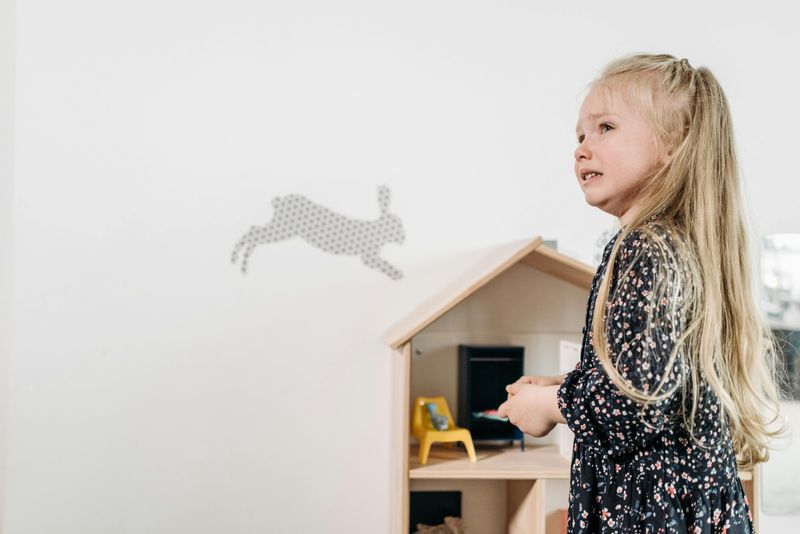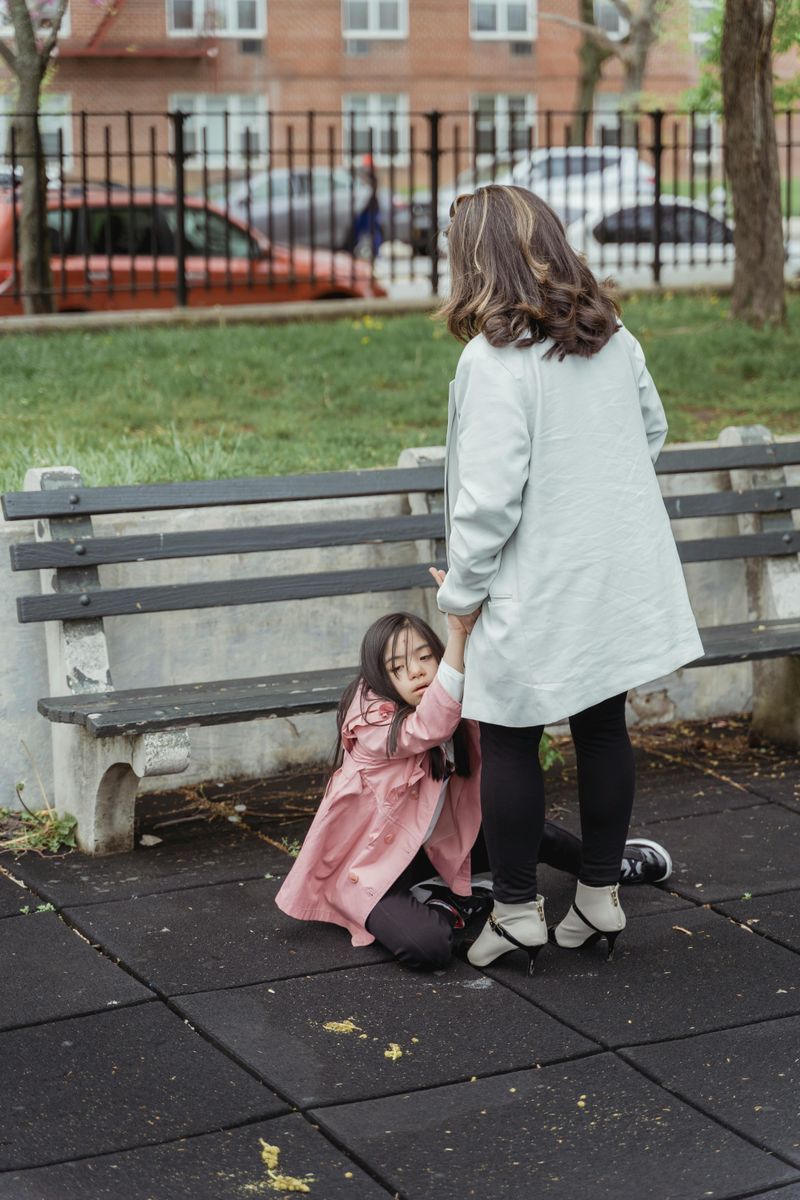As a parent or grandparent, the words you choose matter more than you might think. Some phrases—often said with good intentions—can quietly chip away at a child’s confidence or make them feel misunderstood.
It’s not about being perfect; it’s about being more aware of how language shapes how kids see themselves and the world around them. By shifting how we speak, even just a little, we can build stronger connections and help kids feel safe, supported, and truly heard.
The way we talk to children becomes the voice they carry inside. Choosing our words with care helps raise emotionally resilient kids who know their feelings matter.
1. You’re fine. Stop crying.
When a child is crying, telling them “You’re fine. Stop crying” might seem like a quick fix, but it often invalidates their emotions. Imagine a moment when you felt overwhelmed, and someone dismissed your feelings. It stings, doesn’t it?
Children need to know their emotions are real and important. When our little ones are upset, it’s more helpful to acknowledge their feelings. Try saying, “I can see you’re upset. Want to talk about it?” This approach fosters emotional awareness and helps them feel understood.
Validating a child’s feelings doesn’t mean indulging them but simply recognizing their emotions as genuine. By offering support, you teach them that it’s okay to express emotions, setting a foundation for emotional intelligence and resilience.
2. Big boys/girls don’t cry.
The phrase “Big boys/girls don’t cry” can unintentionally teach children to hide their feelings. This message often sticks, creating adults who struggle with emotional expression. Instead of reinforcing stoicism, encourage open communication.
Next time your little one tears up, try saying, “It’s okay to feel sad. I’m here for you.” It is one of those soft parenting methods that actually works. This not only validates their feelings but also encourages emotional transparency. Kids, like adults, need to process their emotions without fear of judgment.
By offering a safe space to cry and express vulnerability, we cultivate a nurturing environment where they feel accepted and heard. Remember, tears are not a sign of weakness but a natural response to emotions that all humans experience.
3. Because I said so.
The phrase “Because I said so” effectively shuts down any opportunity for dialogue or understanding. It curbs a child’s natural curiosity and makes them feel their questions are unwelcome. Instead, try explaining the reasoning behind your decisions.
Saying, “Let’s talk about why this is important,” invites discussion and opens the door to learning. Children, like adults, are more likely to cooperate when they understand the “why” behind actions. Engaging them in conversation respects their intelligence and fosters critical thinking.
When kids learn the reasons behind rules, they develop a better sense of responsibility and decision-making skills. Encourage those questions; they’re a gateway to growth and understanding.
4. You’re being dramatic.
Telling a child “You’re being dramatic” can make them feel their feelings aren’t valid. It’s like telling them their perspective is flawed. Instead, try to understand their experience. Saying, “I see this is really big for you” acknowledges their feelings without judgement.
Children often experience emotions with great intensity, and labeling them as dramatic can be dismissive. By treating their feelings with sincerity and patience, we help them trust their emotions and build self-awareness.
It’s crucial to create a space where children feel safe to express themselves without the fear of being labeled. This nurtures emotional intelligence and helps them learn to navigate their feelings in a healthy way.
5. Stop acting like a baby.
Saying “Stop acting like a baby” can shame a child, especially during vulnerable moments. Instead of mocking their behavior, meet them with empathy. Kids regress to earlier behaviors when stressed or tired. Instead of criticism, offer support by saying, “I see you’re upset. How can I help?”
This is a type of parenting practice that will raise happy kids as it acknowledges their struggle without belittling them. It’s important to remember that every child is a work in progress, learning and growing each day.
By providing a compassionate response, we teach them that vulnerability is a part of being human, and seeking help is a strength, not a weakness. This kind of support nurtures trust and encourages emotional growth.
6. I’m going to leave you here.
The threat “I’m going to leave you here” can trigger deep-seated anxiety in children. Fear of abandonment is real and telling a child you’ll leave them can create lasting emotional scars. Instead, use positive reinforcement to encourage cooperation. Try, “Let’s find a way to do this together.”
This approach shifts the focus from fear to collaboration. Building trust with children requires consistency and reassurance. When they feel secure, they’re more likely to respond positively to guidance.
Little ones flourish in environments where they know they’re safe and their caregivers are dependable. Offering reassurance instead of threats fosters a bond of trust and security that’s crucial for healthy emotional development.
7. Wait until your father/mother gets home.
“Wait until your father/mother gets home” shifts the burden of discipline to the other parent and creates fear or resentment. Rather than outsourcing discipline, address the behavior in the moment. Saying, “Let’s talk about what happened” provides an opportunity for immediate learning.
Children need to understand the consequences of their actions in real-time. Delaying discipline sends a message that the current parent is incapable of handling the situation. By addressing the issue with patience and understanding, you teach accountability and respect.
This also helps maintain a balanced view of both parents as nurturing figures, rather than one being the “bad cop.” Effective communication is key to constructive discipline.
8. You’re just like your [negative relative].
Saying “You’re just like your [negative relative]” can severely impact a child’s self-esteem and identity. Comparisons can stick, becoming self-fulfilling prophecies. Instead, focus on the behavior, not the person. This habit will help you raise confident kids.
Try, “I notice you’re upset. Let’s talk about it,” and address the specific issue. Such saying encourages self-reflection and growth. Children are individuals, and labeling them based on relatives can create confusion and resentment.
By avoiding negative comparisons, you promote a positive sense of self and teach kids that they have the power to change their actions. Focusing on behavior rather than identity helps them understand that while actions can be corrected, their inherent worth remains unchanged.
9. Why can’t you be more like your sibling?
“Why can’t you be more like your sibling?” fosters sibling rivalry and diminishes self-worth. Each child is unique and comparing them breeds resentment. Instead, celebrate their individual strengths. Saying, “You both have wonderful qualities,” encourages appreciation for diversity.
Little ones thrive when their uniqueness is acknowledged and nurtured. By focusing on their strengths, you help build confidence and encourage mutual respect among siblings. Highlighting individual achievements promotes a sense of value and belonging.
It’s essential to foster a home environment where differences are celebrated and each child’s individuality is recognized. This approach not only strengthens family bonds but also builds a positive self-image in each child.
10. That’s not a big deal.
Saying “That’s not a big deal” can make a child feel their issues are insignificant. When a child shares a problem, it’s big to them and dismissing it can make them feel unseen. Instead, offer empathy by saying, “I hear you. How can I help?” This approach ensures the child feels valued and understood.
Kids need to know that their feelings and experiences are important. Listening with empathy validates their emotions and encourages open communication.
Providing a safe space to express concerns builds trust and helps them navigate future challenges with confidence. By showing you care, you teach them that it’s okay to reach out for support when needed.
11. You always/never…
Using absolutes like “You always/never…” can create shame and defensiveness. It pins a child to a fixed identity, which is not only inaccurate but also discouraging. Instead of doing this, try focusing on some old-school parenting methods that work. Simply saying “let’s work on it together” invites collaboration and growth.
Children are constantly evolving, and absolute statements hinder their potential for change. Addressing specific situations rather than generalizing helps them understand what needs improvement without feeling attacked.
By approaching issues with an open mind and supportive language, you foster a learning environment where mistakes are seen as opportunities for growth, not failures. This encourages personal development and builds confidence.
12. You’re so sensitive.
Telling a child “You’re so sensitive” can discourage them from expressing emotions, fostering self-doubt. When it comes to boys, it can result in raising men who are avoiding traits perceived as ‘feminine,’ instead of teaching them how to be good men. Don’t label them, rather say, “I see you’re feeling deeply about this.”
This encourages self-awareness and acceptance. Sensitivity is a strength, not a flaw, and should be nurtured. By acknowledging their feelings and encouraging open discussion, you help children understand themselves better. It teaches them to embrace their emotions as part of their unique personality.
Promoting emotional intelligence involves recognizing and valuing different emotional responses. When children see sensitivity as a positive trait, they grow into empathetic, understanding adults. Encouraging emotional expression builds confidence and resilience in navigating life’s challenges.
13. I’ll give you something to cry about.
The phrase “I’ll give you something to cry about” uses fear to control, damaging trust. It implies that expressing emotions will lead to punishment. Instead, approach with empathy: “Let’s talk about what’s making you upset.” This fosters a safe space for emotional expression.
Children learn to trust their caregivers when they feel heard and supported. Using threats undermines this trust, teaching them to hide their emotions. Constructive communication helps them process feelings healthily.
By offering understanding rather than fear, you build a relationship based on trust and respect. Encouraging open dialogue about emotions helps children develop emotional intelligence and resilience. It’s crucial for them to know that their emotions are valid and can be expressed safely.
14. You’re making me sad/angry.
Telling a child “You’re making me sad/angry” places emotional responsibility on them, fostering guilt. Instead, own your feelings by saying, “I feel upset when this happens.” This models healthy emotional boundaries and teaches them that while actions have impacts, emotions are personal.
Our young ones are learning to navigate their emotions and relationships. Placing blame for your feelings can confuse them. By expressing your emotions clearly, you demonstrate how to handle feelings responsibly.
This helps them understand that while actions affect others, everyone is responsible for their own emotions. Teaching emotional ownership is vital for developing healthy relationships and personal accountability. It empowers children to express their feelings without fear of blame or guilt.
15. You don’t really feel that way.
No one wants to say it, but certain expressions can lead to parents creating losers, albeit unknowingly. Telling a child “You don’t really feel that way” can confuse them about their emotions. Instead, validate their feelings by saying, “I see you’re feeling this way. Let’s talk about it.”
This encourages honest expression and helps them process emotions. Kids need guidance in understanding their emotional landscape. By acknowledging their feelings, you reinforce their self-awareness and confidence. Rejecting their emotions can lead to self-doubt and mistrust in their instincts.
Supportive communication fosters a safe environment where children feel free to express and explore their feelings without fear of judgment. This approach builds emotional intelligence and resilience, equipping them to handle life’s challenges with confidence and empathy.
16. You’re embarrassing me.
Telling a child “You’re embarrassing me” can fuel feelings of shame and inadequacy. Instead of focusing on your own embarrassment, address the behavior with empathy. Try saying, “Let’s talk about how we can handle this differently.” This shifts the focus from shame to learning.
Little ones often act impulsively and need guidance on appropriate behavior. Addressing their actions with understanding fosters a safe environment for growth. Shaming them publicly can harm their self-esteem and trust.
By guiding them through their mistakes with patience, you help them develop social awareness and self-control. It’s important to separate the behavior from their identity, reinforcing that while actions can be corrected, their worth remains intact.
17. You better behave or else…
Vague threats like “You better behave or else…” create anxiety without teaching. Instead, set clear expectations by saying, “Here’s what will happen if we don’t behave appropriately.” This clarity provides a predictable structure and fosters a sense of security.
Our young ones thrive in environments where they understand the consequences of their actions. When expectations are clear, they can make informed decisions about their behavior. Using specific, consistent language helps them learn accountability and responsibility.
By replacing vague threats with clear communication, you build trust and reduce anxiety. This approach encourages cooperation and empowers children to make positive choices, reinforcing the importance of understanding and respecting boundaries.
18. Stop being so lazy.
Labeling a child as “lazy” can discourage effort and hinder development. Instead, try to understand the root cause by saying, “I notice you’re having trouble getting started. How can I help?” This fosters motivation and problem-solving.
Often, what appears as laziness can be a sign of underlying issues like lack of confidence or understanding. By approaching the situation with empathy, you encourage a growth mindset and help them overcome obstacles.
Offering support and guidance shows that you believe in their potential and are there to help them succeed. This positive reinforcement builds self-esteem and encourages perseverance, creating a foundation for lifelong learning and achievement.
19. That’s a boy/girl thing.
Saying “That’s a boy/girl thing” reinforces gender stereotypes and limits a child’s potential. It can contribute to creating a boys-will-be-boys culture that feminist parenting won’t be able to fix. Instead, support their interests by saying, “You’re free to enjoy what you love.”
This encourages exploration without the constraints of societal norms. Youth should feel empowered to express themselves and pursue interests that genuinely resonate with them. By breaking down gender barriers, you foster an environment of acceptance and inclusivity.
Encouraging children to explore a wide range of activities helps them build confidence and discover their unique talents. It’s important to challenge stereotypes and promote individuality, ensuring that children grow up knowing they are valued for who they are, not confined by traditional roles.
20. You’ll never amount to anything.
Saying “You’ll never amount to anything” can leave deep psychological scars. Instead, offer encouragement: “Keep trying, you’re making progress!” This nurtures a growth mindset and resilience. Kids are in a constant state of learning, and setbacks are part of their journey.
By focusing on effort and progress, you build confidence and motivation. Encouragement during challenges teaches them to persevere and believe in their abilities. Positive reinforcement helps shape a child’s self-perception and future aspirations.
It’s crucial to foster an environment where they feel valued and capable, regardless of failures. By replacing negativity with support, you empower children to strive for their goals and realize their potential.
21. You’re too old for that.
Telling a child “You’re too old for that” can stifle imagination and creativity. Instead, encourage play by saying, “Enjoy what makes you happy.” This supports emotional growth and stress relief. Imaginative play is crucial at any age, helping children process experiences and express emotions.
By allowing them the freedom to play, you nurture cognitive and emotional development. It’s important to remember that play is a vital part of learning and not just for younger children.
Encouraging creative expression fosters problem-solving skills and adaptability. Supporting a child’s right to explore their interests without judgment helps them build confidence and independence, ensuring they grow into well-rounded individuals.
22. Why are you always so difficult?
Labeling a child as “difficult” can create a fixed mindset that stifles growth. Instead, try to understand their perspective by saying, “Let’s figure this out together.” This approach encourages collaboration and problem-solving. Young ones often act out when they feel misunderstood or overwhelmed.
By seeking to understand their feelings, you create an environment where they feel valued and respected. Labels can be limiting, causing children to internalize negative beliefs about themselves. By addressing specific behaviors instead of generalizing, you empower them to change and grow.
This fosters a positive self-image and encourages them to develop emotional intelligence. Offering support and understanding nurtures resilience and adaptability in facing challenges.
23. You’re doing it wrong. Let me do it.
Interjecting with “You’re doing it wrong. Let me do it” undermines a child’s confidence and independence. Instead, encourage them by saying, “Let’s try this together.” This supports learning and skill development. Youth learn best through experience and practice.
By allowing them to attempt tasks independently, you foster problem-solving and critical thinking. Offering guidance without taking over nurtures their ability to overcome challenges. It’s important to resist the urge to fix everything for them, as this teaches resilience and perseverance.
Supporting autonomy builds self-assurance and prepares them for future challenges. By providing support and celebrating their efforts, you help them develop a strong sense of competence and self-worth.
24. Hurry up!
Constantly telling a child to “Hurry up!” can create anxiety and diminish their enjoyment of activities. Instead, try to match their pace by saying, “Take your time, we’re in no rush.” This approach encourages mindfulness and reduces stress.
Kids experience the world differently, often finding wonder in details adults overlook. Rushing them through experiences can stifle curiosity and joy. By slowing down, you help them savor moments and develop a deeper appreciation for their surroundings.
Creating a relaxed pace fosters a love for learning and exploration. It’s crucial to create an environment where children feel their natural rhythms are respected, building patience and resilience in navigating life’s demands.
25. You’re too much.
Telling a child “You’re too much” is definitely not one of those things parents should teach their kids. It can actually make them feel inherently flawed. Instead of dismissing their energy, channel it positively by saying, “I love your enthusiasm! Let’s find a fun way to use it.”
This nurtures self-acceptance and creativity. Youth with high energy often need outlets to express themselves. By embracing their zest for life, you help them harness their strengths. Inspiring positive expression builds confidence and self-awareness.
It’s important to recognize that what may seem overwhelming can be a sign of creativity and potential. Supporting their energy teaches them to value their unique traits and find constructive ways to use them. This fosters resilience and adaptability, empowering them to thrive in diverse environments.
26. Why can’t you just be normal?
Saying “Why can’t you just be normal?” undermines a child’s self-worth, especially for neurodivergent children. Instead, embrace their uniqueness by saying, “I love you just as you are.” This acceptance fosters a strong sense of identity and belonging.
Every child is unique, and diversity is something to be celebrated. By motivating them to be individual, you help them build confidence and self-esteem. Labels and comparisons can limit a child’s growth, but encouragement and acceptance allow them to embrace their true selves.
It’s essential to create a nurturing environment where differences are valued and all forms of “normal” are accepted. This fosters an inclusive community that appreciates diversity and promotes empathy and understanding.
27. Don’t be scared.
Telling a child “Don’t be scared” can invalidate real fear, causing them to suppress emotions. Instead, offer comfort by saying, “It’s okay to feel scared. I’m here with you.” This approach provides reassurance and security.
Fear is a natural emotion that everyone experiences, and acknowledging it helps children learn to navigate their feelings. By offering support, you teach them that it’s okay to express vulnerability and seek comfort. Creating a safe space for exploring emotions fosters resilience and emotional intelligence.
Little ones who feel understood and supported are more likely to face challenges with confidence and learn to manage their fears effectively. Encouraging open dialogue about emotions builds trust and empathy.
28. We don’t talk about that.
Saying “We don’t talk about that” teaches shame and secrecy around important topics. Instead, encourage openness by saying, “Let’s talk about it when you’re ready.” This approach builds trust and opens up channels for meaningful conversations.
Young ones are naturally curious and need guidance on navigating complex subjects. By fostering an environment of openness, you help them feel safe to ask questions and seek answers. Discussing sensitive topics with care and age-appropriate language promotes understanding and reduces stigma.
It’s essential to create a home where dialogue is encouraged, ensuring children know they can approach you with anything. This strengthens the parent-child bond and nurtures a foundation of trust and communication.
29. Good job (when overused or vague).
Overusing “Good job” can dilute its impact, making it lose meaning. Instead, offer specific praise by saying, “I love how you solved that problem by doing…” This boosts confidence and motivation. Kids thrive on encouragement, and detailed feedback helps them understand what they’re doing well.
By focusing on effort and specific achievements, you promote a growth mindset and inspire them to continue improving. Praise that is specific and genuine reinforces positive behavior and encourages perseverance.
It’s important to celebrate details and efforts, not just results. By providing meaningful feedback, you build self-esteem and resilience, helping children recognize their strengths and work towards their goals with enthusiasm.









![You’re just like your [negative relative].](https://herway.net/wp-content/uploads/2025/03/Wait-until-your-fathermother-gets-home.jpg)




















